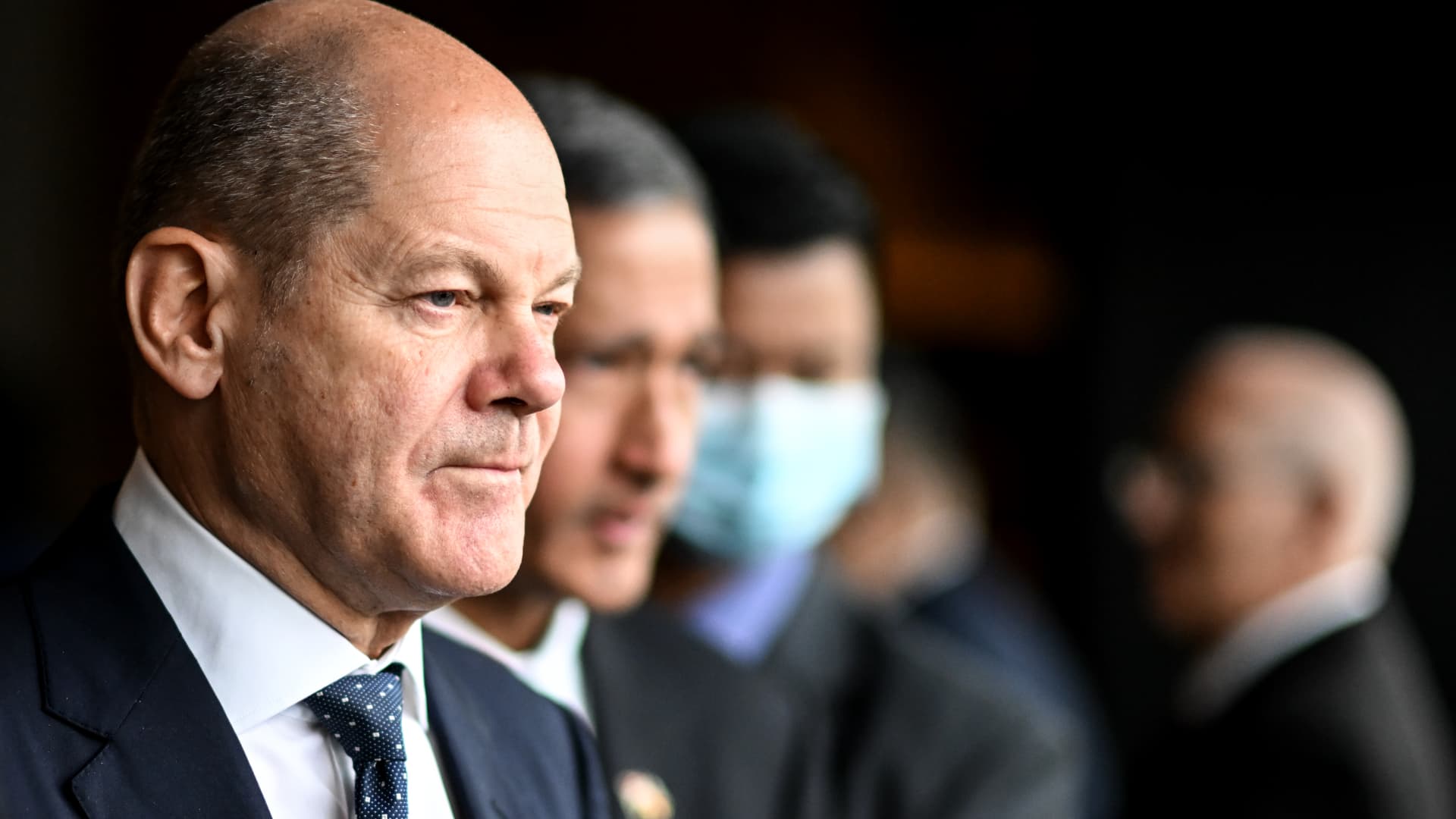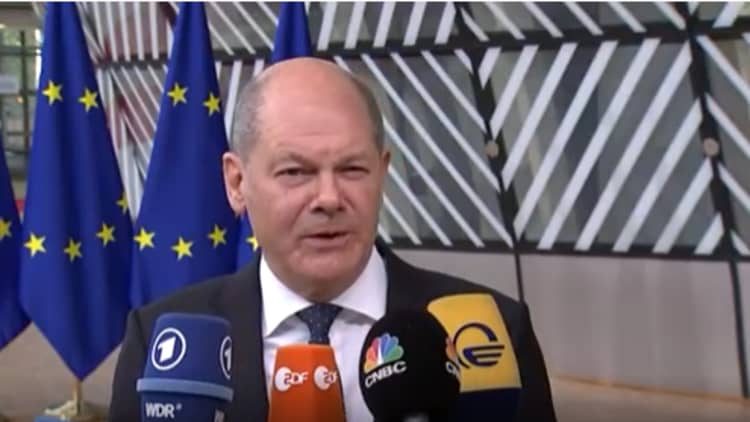
Chancellor Scholz with Singaporean ministers ahead of his speech on Monday.
Picture Alliance | Picture Alliance | Getty Images
German Chancellor Olaf Scholz and Singapore Deputy Prime Minister Lawrence Wong have taken a united stance on continuing to work with China, but also remain committed to diversification.
Scholz, attending the Asia-Pacific Conference of German Business in person for the first time, told a packed room in Singapore on Monday that economies must deepen free trade in the face of geopolitical tension, and not turn to protectionism.
“Free and fair trade benefits all parties involved. It remains the foundation of our prosperity,” he said.
Scholz said Germany is keen to deepen economic ties with Asia-Pacific, not just China, in line with the pursuit of trade diversification.
But diversification, Scholz said, is not decoupling and understanding this at a time when concepts such as “nearshoring,” deglobalization and self-sufficiency are gaining traction is crucial.
Deglobalization is not an option for any one of us.
Olaf Scholz
German chancellor
“Often these are nothing but protectionism in disguise,” Scholz said.
“Deglobalization is not an option for any one of us.”
Fresh research by the Hinrich Foundation said while terms like “friend-shoring” have been added to the U.S. trade policy lexicon and those of other countries like Japan, little has been revealed about what they mean.
“If governments seek to intervene in a supply chain, they must make the case that they observe the risks better than firms do. But it is unclear which market failure friend-shoring policies will fix without further fragmenting the world trading system,” author Halit Harput said.
Scholz also said challenges such as climate change and food insecurity can only be resolved through innovation and competition manifested through trade.
Nearly 600 key German and regional Asia-Pacific leaders were present for Scholz’s keynote speech at the premier business event for German businesses in the region. It was one of only two stopovers between the chancellor’s trip to Beijing last week and the G-20 leaders meeting in Bali, Indonesia this week.
Scholz also visited Vietnam.
When asked how German businesses should tackle both competition and working with China, Scholz said Germany can deal with China if it is able to diversify its economy and supply chains.
Scholz used the examples of Germany fortifying its semiconductor, artificial intelligence and battery industries. In these areas, China is both a competitor and supplier.
Germany’s reliance on China for goods, particularly key materials, has come under scrutiny.
Olaf Scholz in Singapore on Monday.
Picture Alliance | Picture Alliance | Getty Images
Singapore’s Wong said the U.S. and China both have broad interests across Asia and must find a way to coexist, compete and cooperate peacefully.
“So, from Singapore’s point of view, we encourage better diversification. We are all for greater resilience but we would caution against rules that would lead us towards a more fragmented … world, because that will leave all of us worse off,” Wong said after Scholz’s speech on Monday.
But even if the U.S. and China are the “most consequential,” Wong said many economies, including Singapore, have the agency to shape development in their own regions — and most will lean toward greater globalization, not less.
“The reality is that we are moving toward a multipolar world, one characterized by a wide diversity of both overlapping interests,” he said.
“Germany does not want to decouple from China, which remains an important business and trading partner for Germany and Europe. And that’s very much is Singapore’s view too and the views of many countries in ASEAN.”
Robert Habeck, Vice Chancellor and Federal Minister for Economic Affairs and Climate Protection, Lawrence Wong, Singapore’s Deputy Prime Minister, German Chancellor Olaf Scholz and Roland Busch, Chairman of the Managing Board of Siemens AG, meet at the 17th Asia-Pacific Conference of German Business (APK).
Picture Alliance | Picture Alliance | Getty Images
“And within ASEAN, no country wants to be in a position to have the two sides between China or the U.S. There can be no good outcome for us if our countries were forced into two camps, a hardline or worse even a wall in between.”
And to remain open, all countries must be free to continue to participate in the region’s economic playground, he added.
As part of the conference, Singapore and Germany, Singapore’s fourth largest services trade partner in the E.U., signed a new memorandum of understanding, the Germany-Singapore Framework for Sustainability and Innovation.
Speaking at a separate panel following Scholz and Wong, the dean of the Blavatnik School of Government at Oxford University Ngaire Woods said the G-20 meeting in Bali this week would be critical.
Drawing from both Scholz and Wong’s speeches, Woods urged leaders in major countries such as Germany to hold both the U.S. and China accountable for their commitment to global cooperation.

“In doing so, they need to countervail the domestic force in both China and the United States which is pushing them towards a more and more nationalistic ‘America First’ or in China, a ‘self reliant approach’ to global cooperation.”
“We need them not to take forward a new agreement to the World Trade Organization, but to keep it working, to apply the rules.”
